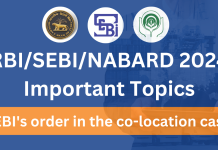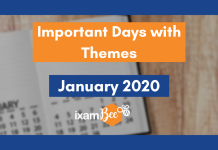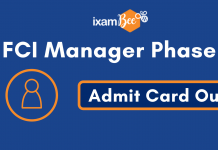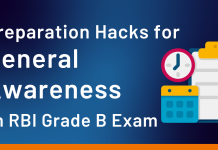Mistakes to Avoid
In my last blog, I discussed the RBI Grade B interview preparation aspects. Hope you have taken note and have been preparing on all four quadrants well. Knowing what to do is very important; equally important is knowing what not to do. In this 3rd blog, I will discuss the mistakes one should avoid in an interview.
There are some common mistakes that should be avoided like not being punctual, not dressing well, being too casual, not making eye contact with all panel members, etc. I will not delve into these mistakes in this blog. I am sure you have read about these and will not make such mistakes in one of the most important interviews of your life; the RBI Grade B 2024 interview.
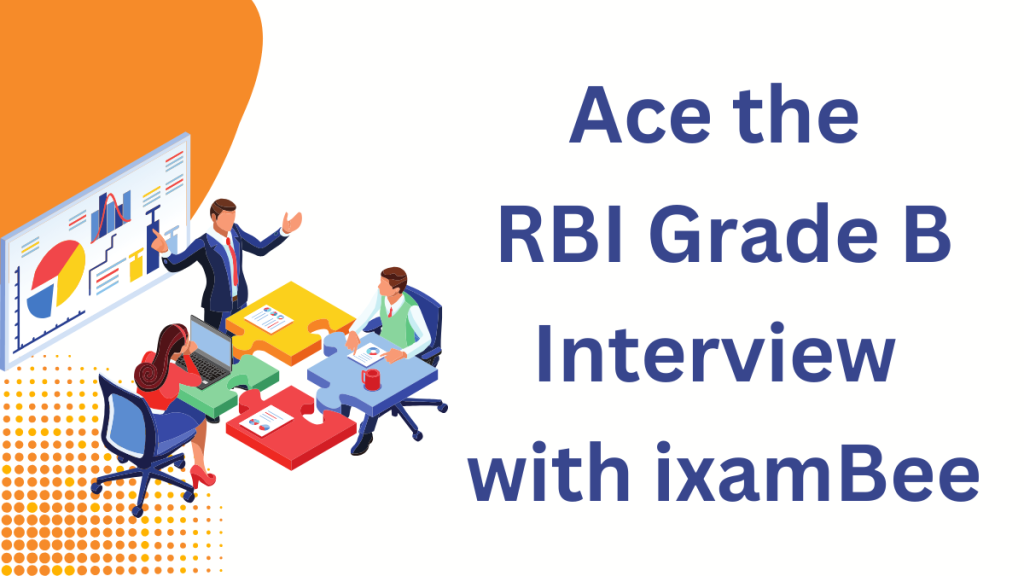
If you are preparing for the RBI Grade B 2025 exam, now is the perfect time to start with the right resources and strategy. At ixamBee, we offer a comprehensive range of tools to support your preparation journey, including expertly curated RBI Grade B Online Courses, extensive RBI Grade B Mock Tests, and a repository of RBI Grade B Previous Year Papers to help you understand the exam pattern and difficulty level. These resources are designed to provide you with a thorough understanding of the syllabus while honing your problem-solving and time management skills.
In this blog, I will discuss 7 key mistakes that I have noticed over the years from my experience of mentoring for interviews in general. In an effort to impress the panel, many candidates make these common mistakes, unknowingly hurting their prospects of selection. So let’s start and explore RBI Grade B Interview guidance from the perspective of what not to do.
RBI Grade B Interview Mistake #1 – Bad-mouthing your previous or current employer
“Why did you leave your last job?” “Why do you want to come to RBI when you have a good job already?” The moment you hear the question, all those problems you face/faced at the previous/current job flashback in your head; the target pressure, the mundane routine, the low salary, the irritating boss, the rural posting, the last promotion that you missed, etc.; And pat comes out the reply in form of all the problems with your employer.
You may feel that you are being honest or that you genuinely have these problems and so sharing them or that you are not bad-mouthing but telling the reality/sorry state of affairs. What it sounds like to the RBI Grade B Interview panel is that you are a person who is likely to run from problems or blame others for problems or failures or shy away from taking up challenges, or would leave the organisation the moment you think there is a better opportunity for you somewhere else.
So does that mean you should lie and talk all good only during your RBI Grade B 2024 interview? No that is not what I mean. You need to remember there is no perfect job, every job has its challenges and set of problems, you need to focus on the solution and not the problem. A better way to approach this question would be to focus on your interest in building a career at RBI rather than considering RBI as an escape from your current problems. Our RBI Grade B Interview preparation should focus on presenting even the most grim situations as a learning opportunity. Avoiding negative remarks about your employer during the RBI Grade B 2024 interview is a critical aspect of effective RBI Grade B Interview Preparation.
RBI Grade B Interview Mistake #2 – Justification mode
While some candidates choose to bluff or over-impress, some may be less confident about the choices they have made. I have often seen that candidates start to justify their choices when asked questions related to gaps/breaks after completing an education degree, or not pursuing/giving more time to one’s hobbies/interests or reason to switch between the science and finance-related profiles/jobs. A range of justifications I have heard right from blaming the parents, and family conditions to paucity of time to pursue hobbies. My RBI Grade B Interview guidance to such candidates has been to focus on the positive side and answer confidently about the choices you made. You do not need to justify your decisions (they are anyways behind you now and cannot be changed). Instead, talk about the learnings from those and how these have helped you in shaping up your thought process think ahead. Ownership is an admired trait in any individual; personally, I believe it’s also a liberating one. The moment you stop blaming others/circumstances and start taking ownership for the decisions you made or things that happened to you, you start seeing solutions and move ahead with more energy and confidence.
To ace the RBI Grade B Exam, focus on showcasing your growth rather than justifying past decisions in the RBI Grade B 2024 Interview.
RBI Grade B Interview Mistake #3 – Bluffing or faking an answer
I tell this to so many candidates I have mentored for interviews – the experience of the people sitting on the panel is more than your age. They can read your personality in those 15-20 minutes very well right from the way you enter the interview room, your answers, your expressions, tone, the way you sit, etc. So please do not bluff or fake yourself. The panel members can understand when you are being honest and when you are bluffing. If you do not know an answer, pass it. If you are not sure of an answer, ask permission to try and answer accordingly. The interview is primarily a test of your personality and not your knowledge. It is not essential to know everything, but it is of utmost importance to know what you do not know and not be ashamed to acknowledge that.
Do not get me wrong here; I am not saying that you should not prepare for the RBI Grade B 2024 interview and say that you don’t know every question asked. But in case you do not know something, remember it is alright to pass. The interview is not marked like an MCQ-based RBI Grade B exam where for every right answer you get marks while every wrong answer has a negative marking. The RBI interview 2024 is marked based on what the interviewer feels about you as a person on the parameters like personality, communication skills, leadership and team skills, etc. Bluffing just shows that you have a personality to not own up to your mistakes, or not learn from failures. You must avoid that at all costs as part of your RBI Grade B Interview preparation.
The RBI Grade B Mock Interview sessions can help you identify and avoid bluffing tendencies, a key aspect of RBI Grade B Interview Guidance.
RBI Grade B 2024 Interview Mistake #4 – Impressing the board with big jargon or learned men’s hobbies
This is another form of bluffing. In the last mistake, I discussed bluffing from the point of view of what you may not know, while under this mistake I will discuss faking things about yourself in an effort to impress the RBI Grade B Interview panel members.
You might have heard that one can drive their own interview. This is because an interview is like a conversation where one thing leads to another. So whatever you say leads to another related or follow-up question; and if you cannot answer or fumble to answer the follow-up question, it just shows the knowledge is superficial.
Let me give you an example. When asked about interests, a candidate ends up saying that he/she is passionate about reading economics magazines or non-fiction books on economics when he/she doesn’t really read books. Now if quizzed about the books he has read (which is most likely to be the follow-up question), if he/she cannot come up with a name or cannot explain what he/she reads or says that it’s been a long time since he/she has read a book as he/she was busy preparing for the RBI Grade B exams, it leaves a bad impression about the candidate in the panelist’s mind. Let’s take another example. A candidate is asked about the NPA problem and while explaining he/she mentions about financial stability report and the twin balance sheet problem. There is no harm in mentioning these till you can draw the connections and explain them if asked. One should be prepared for a follow-up question on the twin balance sheet problem in this case. However, if you do not know then avoid using such terms.
Your RBI Grade B Interview Preparation should include practicing realistic responses and avoiding jargon that you cannot explain.
RBI Grade B 2024 Interview Mistake #5 – Not listening to the question
In my experience, this can happen because of two reasons; either you are too stressed or tired which leads to your mind zoning out due to lack of rest or you have a listening inability (I am not talking about hearing inability, hearing and listening are distinct from each other). While the first one is easy to rectify, the second one is more serious. To avoid the first kind of mistake in your RBI Grade B Interview, rest well the night before your RBI interview and remain calm so that you have a fresh and alert mind during the interview. Now coming to the second kind of mistake related to not listening carefully. Many a time the candidates are in a hurry to reply and anticipate the question after hearing the first few words from the interviewer and starts preparing the answer in his/her mind. In such cases, the candidate may not really understand the question asked or miss out on other parts of the question asked leading to a sub-optimal answer. Even worse is the situation when in a hurry to reply, the candidate cuts in with his answer while the interviewer is still speaking.
A successful RBI Grade B 2024 Interview depends on listening actively, a skill emphasized in RBI Grade B Mock Interviews.
Mistake #6 – Following either of the two extreme answer formats
Let me elucidate this point. On one hand, I have come across some candidates who in an effort to be ‘to the point’, end up giving single-word answers like yes or no, thereby coming across as ill-informed, indifferent, or difficult to carry on a conversation with. On the other hand, some candidates do not know when to stop and go on and on. Very few candidates are able to find the right balance. One must keep the answers succinct, to-the-point and focused and avoid being very terse or verbose while answering.
Many a time, candidates ask me how to know when to stop. My simple reply is, give the most important points of the answer first in 1-2 lines and then depending on the interest of the panel and the depth of the question, decide whether to continue further or not. Another aspect to be kept in mind is that for profile and HR-related questions also one should list out the points well without getting into too many personal details or rambling on about your whole life story.
Striking the right balance in your answers is essential for clearing the RBI Grade B Mains Result and performing well in the interview.
Mistake #7 – Rehearsed answers
“Why do you want to join the RBI? I want to be in policymaking and want to contribute to my nation.” “RBI is a learning organization and I want to learn from the best institute in finance in the country”.
Frankly, I have lost count of the number of candidates who have given this exact same reply to me in the mock interviews. Please do not make this mistake of mugging and then vomiting out an interview script. An interview should follow a natural flow of communication between the interviewer (the panel members) and the interviewee (candidate). Be your natural self. Prepare for the interview by anticipating the questions on the four aspects which were discussed in Ace RBI Grade B Interview with Prachi Agarwal – Part 2. However, do not mug up the answers. You can have a broad framework of points to various types of questions, but the exact words and formation should be natural and free-flowing during the actual interview. Rehearsed answers are easily caught, so focus on authentic communication during the RBI Grade B 2024 Interview.
Hope this blog will help you to prepare even better and bring you a step closer to your selection as an RBI Grade B officer. In my next blog, I will talk about the importance of mock interviews. So, stay tuned!

Conclusion
In conclusion, preparing for the RBI Grade B 2024 Interview requires more than just knowledge; it demands self-awareness, authenticity, and strong communication skills. Avoiding these common mistakes can significantly improve your chances of success. Whether it’s through active listening, avoiding rehearsed or exaggerated answers, or presenting yourself with confidence and integrity, every step of your preparation should reflect your readiness for the role.
Leveraging resources such as RBI Grade B Mock Interviews and tailored RBI Grade B Interview Guidance can provide valuable insights into what the panel expects. Remember, the interview is not only about clearing the RBI Grade B Mains Result but also about showcasing your personality, decision-making, and problem-solving abilities. With the right approach and dedication, you can ace the RBI Grade B Exam and secure your position as an officer.
Stay focused, keep preparing, and good luck with the RBI Grade B notification and the exciting opportunities it brings!
At ixamBee, we specialize in providing comprehensive online courses for government exams and online courses for government jobs. Our expertly designed courses for government jobs cater to a wide range of upcoming government exams. Whether you’re preparing for specific courses for government exams or seeking general guidance, ixamBee offers the resources like Beepedia previous year papers, SSC CGL, SSC CHSL, SSC MTS and other mock tests to succeed in exams like RBI Grade B, SEBI Grade A, NABARD Grade A, RRB NTPC, SSC MTS, NIACL Assistant, and more.
Also read
Ace RBI Grade B Interview with Prachi Agarwal– Part 1
Ace RBI Grade B Interview with Prachi Agarwal – Part 2
Ace RBI Grade B Interview with Prachi Agarwal – Part 4
Ace RBI Grade B Interview with Prachi Agarwal – Part 5









